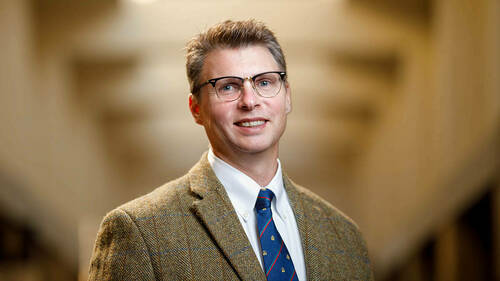
Patrick Griffin, Madden-Hennebry Professor of History and director of the Keough-Naughton Institute for Irish Studies at the University of Notre Dame, has been named honorary professor at the University of Edinburgh’s School of History, Classics, and Archaeology.
One of the world’s leading scholars in transatlantic history, Griffin is the author of numerous books, including "The Townshend Moment: The Making of Empire and Revolution in the Eighteenth Century" (Yale University Press, 2017) and "The People with No Name: Ireland’s Ulster Scots, America’s Scots Irish, and the Creation of a British Atlantic World" (Princeton University Press, 2001).
Griffin’s interests map very closely on two areas of world-class expertise at the University of Edinburgh: American and Irish history.
A key event in his association with that university was the founding and organization of the Global Dome Ph.D. program in 2012 with Frank Cogliano, professor of history at Edinburgh. The Global Dome Program has been a highly successful, intensive seminar designed to accelerate dissertation progress and build international networks of young scholars in the humanities field. The program was cited as one of Griffin’s distinctions when Notre Dame’s Graduate School awarded him the James A. Burns, C.S.C., Award in 2017.
At the University of Edinburgh, an honorary professorship is conferred on scholars who undergo a rigorous evaluation process and is considered equivalent to a full professorship.
Edinburgh is consistently ranked in the top 20 world universities in the QS World Rankings, with its program in history named as 17th in the world in the most recent rankings.
“I am thrilled with the great honor of being affiliated with the University of Edinburgh,” said Griffin.
“Each time I have given lectures at Edinburgh, met with faculty or worked with graduate students, I see that the University and its history department are considered preeminent for good reason. I am looking forward to working closely with my new colleagues for years to come.”
Originally published by at irishstudies.nd.edu on Oct. 22.